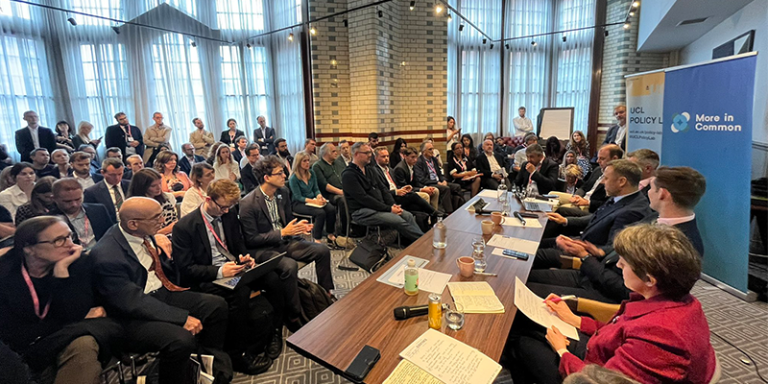Discussion helps chart a path to disagreeing well
3 October 2023
Discussion at Conservative Party hosted by UCL Policy Lab and More in Common shows that agreement is possible on issues seen as divisive.

In recent years, the so-called 'culture war debates' have taken centre stage, dominating discussions within politics and society at large. From diversity targets to so called 'cancel culture', these debates have sparked intense discussions and divided public opinion. But what do the people really think about the 'war on woke'? Is it a popular movement, and does it align with conservative values?
The panel discussion, hosted by UCL Policy Lab and More in Common, sought to shed light on these questions by presenting findings from extensive polling and focus group insights. The event explored the merits and costs of the 'war on woke' and delved into how politics and our national institutions can better manage these contentious debates. Emily McTernan, Associate Professor in Political Theory at University College London, joined this panel at the Conservative Party Conference in Manchester.
While the 'war on woke' rages on, another battlefront has emerged in our everyday lives - the question of when to take offence. In a world where someone may fail to shake your outstretched hand, make an inappropriate joke, or put you down in front of others, the issue of whether we should take offence has become increasingly relevant.
In her thought-provoking book On Taking Offence, panellist Emily McTernan takes a stand in favour of taking offence as a morally appropriate and socially valuable response. She argues that within societies marred by inequality, taking offence can serve as a powerful tool to resist the day-to-day reinforcement of social hierarchies. McTernan emphasises that the significance lies in the details of our social interactions. Small acts and the underlying social norms can cumulatively express and perpetuate social hierarchies. By taking offence, individuals can signal that a particular act is an affront to their social standing and communicate their rejection of that affront to others.
Taking offence, according to McTernan, is not merely an expression of hurt feelings. It is a way to challenge and renegotiate the shared social norms that dictate what constitutes respectful treatment. In this light, taking offence becomes a means to stand up for one's social standing. Crucially, when individuals with lower social standing take offence, it can be a direct act of insubordination against entrenched social hierarchies. In unequal societies, the inclination to take offence at the right things and to the right degree may even be considered a civic virtue.
What may surprise some is that the right things to take offence at often encompass apparently trivial and small-scale details of our social interactions. These seemingly insignificant instances are precisely what opponents of a culture of taking offence find most objectionable. Yet, McTernan's argument challenges us to reconsider the value of taking offence to combat everyday inequalities and promote a fairer and more inclusive society.
These issues are explored as part of the Disagreeing Well series.
Sign up HERE to the Policy Lab newsletter to receive the latest news and events.
 Close
Close

